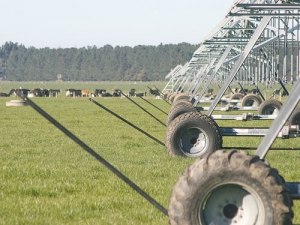Hawke’s Bay sheep and beef farmers warned to monitor stock water wells
Sheep and beef farmers in Hawke's Bay are being urged to keep a close eye on the wells that supply water to their stock.
 While drought conditions persist in many parts of the country, some irrigating farmers are coping well.
While drought conditions persist in many parts of the country, some irrigating farmers are coping well.
While drought conditions persist in many parts of the country, some irrigating farmers are coping well, says IrrigationNZ.
These farmers are handling the dry conditions with the aid of water supplied from alpine-fed irrigation schemes.
Farmers taking water from rivers and lakes topped up by West Coast rain have benefited from El Nino's erratic weather pattern this summer, says IrrigationNZ CEO Andrew Curtis.
"While we support the minister's move to extend the official drought in the South Island, it is interesting to note that farmers connected to the big alpine-fed rivers and lakes haven't struggled this season, despite low rainfall on the East Coast and an early start to the irrigation season with high temperatures in spring," says Curtis.
"While those irrigating from foothills-fed rivers and lakes have been on restriction for several weeks, alpine-fed irrigators have managed to maintain supply. This reinforces our argument around building additional water storage infrastructure that taps into alpine sources. Even in an extreme El Nino event like this season, alpine-fed supply offers a high degree of reliability for irrigation. For futureproofing we need to move in this direction."
Curtis highlights the experience of Central Plains Water in its first season as further evidence.
Central Plains Water chief executive Derek Crombie says the new scheme has coped well – even with little rain in Central Canterbury - due to the shoring up effect of Lake Coleridge.
The stage one development, which opened in August irrigating about 20,000ha in an area bordered by the Rakaia and Hororata Rivers, takes water from the Rakaia River with additional storage held within the lake.
"It's been going really well. We've been at peak demand since mid December but the scheme is doing the job and from what I hear talking to shareholders, they're getting better productivity than last year," says Crombie.
"We have been able to supply 100% of demand but actual use has been a lot less than farmer expectations. We have had full run-of-river water 89 days and only 12 days when we were using stored water for all of our demand."
Liz Soal, policy manager at the Waitaki Irrigators Collective, says irrigators taking water from the Waitaki River and Waitaki Lakes have similarly experienced few difficulties.
"Irrigators taking from the main stem of the river have had no restrictions, only those taking from tributary rivers. It's the same story as last year. We have100% reliability of take. Overall our irrigators taking from the Waitaki River and Lake Waitaki have found the very dry conditions comparatively easier to manage than those on restrictions."
Other irrigation schemes managing to maintain flows despite little rain pre Canterbury include the Mid Canterbury schemes connected to the Rangitata Diversion Race.
In contrast, the foothills-fed Lake Opuha has been on 50% restriction for nearly a month and expects to carry that through to the end of the irrigation season. Many irrigation schemes in Otago and Marlborough are also on heavy restrictions.
IrrigationNZ has released two new resources this week to support irrigating farmers trying to eke out water until the end of the season. A precision irrigation resource provides expert advice around precision irrigation techniques, including variable rate irrigation which applies water at different volumes and speeds along the irrigator.
The second resource outlines the hydraulic and pumping considerations for irrigation. Both guide books are available free of charge on IrrigationNZ's website www.irrigationnz.co.nz under its SMART Irrigation Programme. A soil moisture monitoring resource will shortly be available.
Agrisea NZ has appointed Craig Hudson as it's new chief growth officer.
State farmer Landcorp, trading as Pamu, is a forecasting a full-year net profit of around $100 million.
Tony Aitken, chief executive of Ruralco, has been awarded the Excellence in Business Leadership Award at the ANZ Business of the Year Awards.
Global trade has been thrown into another bout of uncertainty following the overnight ruling by US Supreme Court, striking down President Donald Trump's decision to impose additional tariffs on trading partners.
Controls on the movement of fruit and vegetables in the Auckland suburb of Mt Roskill have been lifted.
Fonterra farmer shareholders and unit holders are in line for another payment in April.